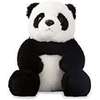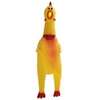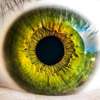What does your child see?

In utero, what does your baby see?
The child begins to see as of the 7th month of pregnancy. The fetus can thus perceive light.
An experiment was conducted and showed that when a light source was placed on the mother's belly, the baby would then direct its gaze towards the light. Sometimes, a baby who is agitated at night, calms down with a little light under the comforter.
The child's view at birth

According to various studies, newborns can see up to 19 cm. Therefore, your face must be less than 20 cm away if you want your baby to see you. This short range allows him to distinguish the breast, which facilitates breastfeeding.
The amazing thing is that at only 36 hours of life, your baby is able to distinguish 3types of emotions on the face: joy, sadness and stupor. The closer you are to your baby and the bigger the expressions on your face, the more your child will be stimulated. A big smile with your face close to his will therefore tend to reassure him.



At 3 months, your baby can see at 60 cm, distinguishes contrasts well but not colors

At 3 months, your child can see up to 60 cm. He distinguishes contrasts well but still does not see colors. Therefore, black and white toys should be preferred to stimulate your child. Your child will be much more absorbed by a contrasting toy than a toy that has many colors in the same tone. If the child can distinguish an object well, he will try to catch it and thus help his neuro-sensory development, if he cannot see it he will develop less. Unfortunately, these toys are less easy to find in the shops, think of the panda...
4 months: yellow, red and relief
At 4 months, your child begins to distinguish colors, especially yellow and red. He also becomes aware of the notion of relief.



6 months: 2/10ths
At 6 months, the child sees the equivalent of 2/10ème. He can thus dinstinguish a wire of near and follow its movements.
9 months: 3/10ths
Your child sees 3/10ths at 9 months of age.
Your child's eyesight after 1 year

- At 1 year : 4/10th
- At 2 years old: 6/10ths, he can recognize objects at a distance and distinguish colors very well without confusing them.
- At 4 years old : 10/10th
- At 14-16 years old: 12/10th or 14/10th. In adolescence, we are at the top of our visual capacities and it is past this age that it decreases. For the luckiest among us, as you get older you will remain at 10/10.
Marie Messager
Osteopath specialized in pediatrics
in Versailles Chantiers
78 - Yvelines



